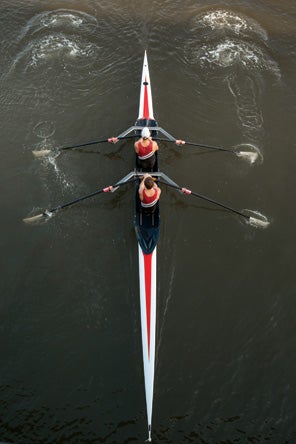Come join the College’s crew team. You’ll need to get up before sunrise each weekday and row until your arms are shaking. Then come back for an exhausting afternoon session of weightlifting and conditioning.
When your classmates are going out at night, you’ll be heading to bed. When they blow off steam during winter break and decompress from fall semester finals, you’ll be putting in time on the indoor rowing machine. You’ll be spending your spring break, too, doing double sessions on a river somewhere.
And after all this practice, you’ll spend less than an hour on the water in competition.
Sound good?
Travis Landrith ’98 concedes it sounds like a raw deal.
“The average person is going to look at you like you’re crazy,” admits Landrith, who has been the College’s crew coach since 2008.
Yet each year, a few brave souls join the crew team and push their bodies to new heights. Inevitably, a few drop away as time goes on. In 2009, Joseph Berger ’13 and Hank Hays ’13 were among 14 freshmen to join the crew team. Four years later, they were the only two seniors remaining from that group. They were also teammates who accomplished the unimaginable: winning the College’s first national rowing championship.
Their victory at the 2013 American Collegiate Rowing Association championship at Lake Lanier in Gainesville, Ga., was no fluke. Berger and Hays earned every bit of their victory in the men’s double. In a sport that is more or less a seven-minute sprint down the water and usually counts on a photo finish to determine the winner, Berger and Hays powered their boat to a clear win in the final race, putting open water between them and the runner-up, the University of Rochester.
Physically speaking, the champs are an odd couple. Berger is a trim 5 feet 10 inches tall and weighs 160 pounds while Hays is a giant at 6 feet 5 inches tall and weighs upwards of 225 pounds. This disparity is not to their advantage, as two- man boats usually perform better when teammates are of equal size and their rowing more easily synced. But Berger and Hays share a passion for rowing and a determination to finish at the top. Berger, Landrith says, “knew what it meant to be a winner from Day One.” As for Hays, Landrith says he was never satisfied with being anything less than the best.
“Hank’s ready to grasp, ready to learn more, always wanting to know how he could get better,” notes Landrith. “He would ask that question every time he came off the water: What else do I need to do?”
Beyond four years of weekday practices with Landrith and their teammates, the pair rowed weekends in Mt. Pleasant at the Charleston Rowing Club, training with rowing champ Rob D’Italia. Oftentimes, Berger and Hays rowed single boats against each other, pushing one another to the limit.
Despite their love for the sport, it wasn’t always easy to stay committed. During his sophomore year, Berger grew frustrated at his boat’s lack of success.
“When you’re waking up at 5:30 to not go fast, to not win, it’s definitely very demoralizing,” he says. “Losing is terrible. It’s so painful.”
Berger was holding himself up to a high standard – one set by his father, Frank, who rowed with great success at Temple University. During practice at the College, the younger Berger would wear the crew shirts his father had collected decades ago from vanquished opponents. These shirts, which sat for years in boxes in the Bergers’ Mt. Pleasant home, gave him motivation for his own victories. As he knows, it’s humiliating to have to give someone who has outperformed you the shirt off your back – a tradition at crew competitions.
Both Berger and Hays credit Landrith, who rowed at the College himself, for their accomplishments and for resurrecting the College’s 24-year-old crew program to national prominence.
“I think that’s what a good coach is, a good foundation for a crew,” says Berger, who as a sophomore had won a third-place medal in a single boat at the national championships.
Landrith returns the compliment, praising Berger and Hays for their commitment to the sport. He fondly recalls traveling to Georgia in May with the two seniors for their final race, their boat strapped to the roof of Landrith’s truck as they cruised the highway. Watching the race from shore, Landrith saw Hays and Berger come into sight with about 1,000 meters left. They were in the lead, and fending off an advance from Rochester.
On board the boat, the seniors watched Rochester warily as they powered toward the finish. Hays and Berger made sure not to squander their advantage.
“When Rochester started pulling a hard piece, we pulled twice as hard and twice as long,” Hays recalls. “Somehow we harnessed the energy to blow everyone out of the water.”
At 500 meters, Landrith knew Berger and Hays had it in the bag. When they came off the boat, he gave them each a big hug. Later, he placed first-place medals on the national champions, and they placed one around his neck, too. Landrith was proud to share that moment with Berger and Hays, describing it as the “purest, most unadulterated joy you could ever feel.”
It’s what makes all those sacrifices – the early mornings, the exhausting practices, the forgone fun – feel like a great deal after all.





